Answer these simple questions and we will find you the BEST prices
Which type of solar quotes do you need?
It only takes 30 seconds
100% free with no obligation

Get up to 4 quotes by filling in only 1 quick form

Compare quotes and find yourself the best deal

Increase the value of your home by installing solar panels
- Householdquotes.co.uk
- Solar Panels
- Cheap Solar Panels
Cheap Solar Panels: Are They Worth It In The UK?

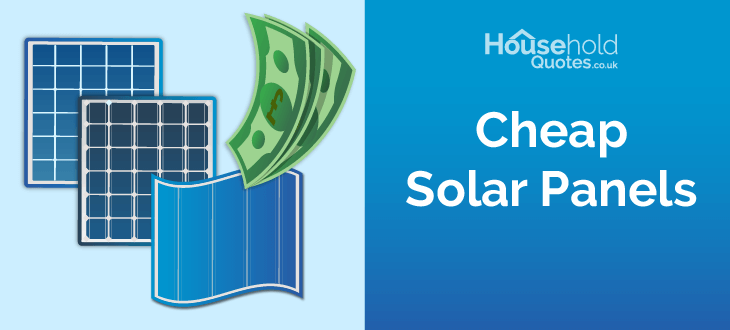
- Cheap solar panels can be up to 30% more affordable than standard monocrystalline panels.
- Despite their affordability, they often are less efficient, have a lower tolerance to higher temperatures, and require more roof space.
- Standard solar panels are generally better because they can last longer and generate more power per m2.
Over the past 20 years, solar panels have become more affordable as the technology has grown in popularity and as more types of panels are available. While the standard cost of solar panels can be between £2,500 - £10,500 (2kW to 6kW systems), there are cheaper options available. Let’s review the cheapest solar panel types and whether they’re worth it compared to standard-priced ones.
Note: The prices we provide are estimates. If you’re looking to install solar panels, it’s best to get prices from a professional installer. However, finding a reliable one can take days of research and collecting prices on your own. That’s why our service can be a far better alternative. It lets you sit back and relax while we get you up to 4 free, non-binding quotes from the best installers.
All you have to do is fill out a 30-second form, and we’ll do the rest. Click the button below to get started.
- Quotes from local installers
- Payment by finance available
- Save up to £915 per year
It only takes 30 seconds

What are considered 'cheap' solar panels?
Cheap solar panels are generally cheap for several reasons. Sometimes, the materials they comprise can be different, i.e., thin-film solar panels. These can cost 30% less than standard solar panels at their lowest. For reference, cheap solar panels can cost between £2,000 to £6,000 at their lowest, while standard monocrystalline panels tend to cost £2,500 - £10,500.
| Total performance | Total costs | Total savings per year |
|---|---|---|
| 1,8kW | £1,300+ | £189-£243 |
| 2kW | £2,000+ | £210-£270 |
| 3,5kW | £2,600+ | £368-£473 |
| 4kW | £3,750+ | £420-£540 |
| 6kW | £5,700+ | £630-£810 |
As a comparison, a regular 4kW solar system can cost as much as the cheapest 6kW thin-film solar panels. However, a standard 5kW solar system or 6kW solar system will have higher annual savings than thin-film solar panels, accruing up to £1,005 annually.
Other times, solar panels can be cheap because of the brand they come from. Brands that price their monocrystalline solar panels lower often have worse warranties or customer service. Many companies such as Jinko and LONGi are Chinese brands offering competitive prices due to lower manufacturing costs, while others like Suntech can produce locally, thus decreasing shipping costs for UK consumers.
| Brand | Price | Output per panel |
|---|---|---|
| Suntech | £120 - £200 | 400W |
| Jinko | £112 - £180 | 550W |
| LONGi Solar | £120 - £246 | 430W |
What are the cheapest types of solar panels?
There are multiple types of solar panels with varying efficiency levels and power outputs:
Thin-film solar panels
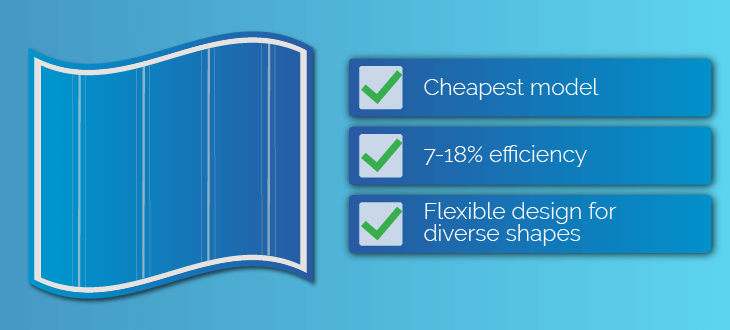
The cheapest solar panels in the UK are thin-film solar panels. With a thin and flexible design, they can be melded into more diverse shapes. Created by layering various materials like silicon, cadmium telluride, copper indium gallium selenide, and others, they host a comparatively low efficiency (7-18%) compared to purer panel structures.
The process means that they have a non-crystalline, 'amorphous' structure, which is less adept at absorbing solar energy. While they are more affordable than traditional crystalline panels, their lack of efficiency and output means they will often require up to twice as many panels as monocrystalline ones to generate the same level of energy.
Polycrystalline panels
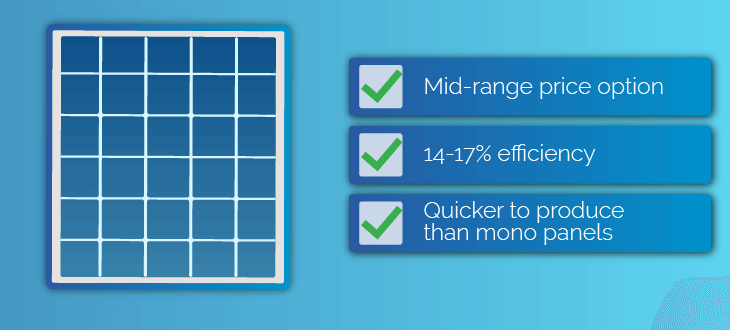
Polycrystalline solar panels are a mid-range price option that has higher efficiencies and power outputs than thin-film panels. They are less efficient than monocrystalline panels and are made by melting multiple silicon crystal fragments as opposed to a single type. This lack of material uniformity gives them a lower efficiency rate, averaging between 14-17%.
They also have a lower lifespan due to less electron movement. One positive of these panels is that the manufacturing process is more environmentally friendly and can be both cheaper and quicker to produce.
Monocrystalline panels
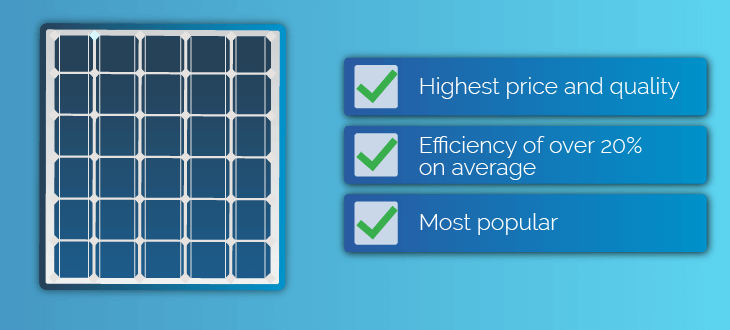
The most expensive yet most popular form of photovoltaics, this category contains all of the best solar panels in the UK and is also the oldest type of solar panel. These are what we think of when talking about standard solar panels. They consist of single-crystal silicon cells, meaning that they have a more uniform material basis, making them more efficient, averaging about 20% or higher.
Monocrystalline panels are manufactured by cutting pure silicon bars and smoothing edges. They have the highest power output and can maintain performance in hotter temperatures. Although they are the most expensive type of solar panels, the advances in recent years have allowed for a drastic decrease in prices, with many of the brands listed earlier offering competitive prices.
While monocrystalline panels are not cheap overall, some models can be as low as £120 per 400W.
What is the difference between cheap and premium solar panels?
Cheaper solar panels tend to sacrifice quality in favour of affordability. Many affordable options have lower lifespans, lower efficiencies, lower outputs, and less extensive warranties. They may also have worse seasonal performance or heat up and lose efficiency further. Here are some key differences between cheap solar panels and premium ones:
| Premium solar panels | Cheap solar panels |
|---|---|
| Purer materials | Often mixed materials |
| Higher output | Low output |
| Designed for powering homes | Designed for low-energy devices |
| Longer lifespan | Shorter lifespans and warranties |
Some monocrystalline panels may seem cheap at first glance, but there may be hidden prices. Many good, cheaper options with high outputs and efficiencies come from manufacturing powerhouses like China. However, it’s important to keep import costs in mind, as they may not end up being as affordable, depending on where you live.
That’s not to say cheaper solar panels have no upsides. For example, thin-film solar panels come in various shapes and sizes. They are more flexible despite having less impressive thermal performance. Similarly, polycrystalline panels can be more sustainable to produce than monocrystalline ones.
What are the benefits and drawbacks of low cost solar panels in the UK?
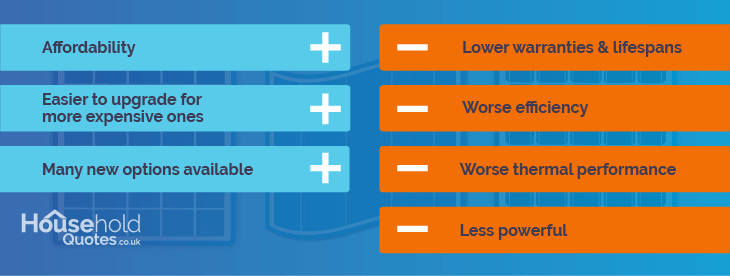
There are numerous advantages to acquiring lower-cost solar panels that could make them worthwhile for many homes, especially for those looking to dip their toes in the water.
- Affordability: The obvious positive is that you pay less overall. Cheaper or discount solar panels can be less of an investment, allowing you to buy more for less money. Sometimes, you can buy high-capacity panels by sacrificing a decent warranty or thermal performance and it might work out if these are characteristics your home can live without.
- Easier to upgrade for more expensive ones: Affordable panels allow you to test out with a smaller setup and see if the savings will be worth it with a better system. You may want to start small and work your way up.
- Many new options available: As the technology has progressed, there are numerous options available for consumers. There are even high-powered solar panels that can compete in power output, although they may be less available since many come from other countries.
While all these positives might sound great, there are numerous downsides to keep in mind before you get your wallet out.
- Lower warranties: Many cheaper solar panels compromise on warranties which is not a good sign in terms of the company’s faith in their product. This can be an indication that they may not last very long.
- Worse efficiency: A standard solar panel’s efficiency should be higher than 21%, but less expensive ones may go below that. This may not seem like a problem if you can compensate with output, but solar panels lose their efficiency over time. Starting off with a low baseline will mean it only declines further every year.
- Worse thermal performance: One of the areas that a lot of cheaper types of solar panels, such as thin-film and polycrystalline panels, suffer in is their performance at high temperatures. Their outputs and efficiencies may suffer due to seasonality.
- Less powerful: Often, but not always, they can be less powerful, which will mean you need more panels to get the same level of output. This can be an issue if you have limited roof space.
Are cheap solar panels worth it for UK households?
So, when it comes to cheaper options, are solar panels worth it in the UK if they aren’t top-of-the-line? This can depend on what you need them for. If you want to charge a few appliances, cheaper types of solar panels can be the way to go.
However, buying solar panels cheap can be a double-edged sword. While they can be handy for smaller appliances, powering a house will require more of them and more space per solar panel system. If you want to charge a lot more and have less space available, you may want to opt for monocrystalline panels with higher outputs.
As stated earlier, there are cheaper options with high capacity and efficiencies, but they also come with drawbacks. They may not all last as long as standard-priced panels since they could degrade earlier. Similarly, lower lifespans and worse thermal efficiency also mean a lower rate of return. These may not be prevalent issues for all households, so it’s best to do your research.
Regardless, solar panels can still come in handy. Cheaper ones can be a great way for beginners to see if their home is cut out for solar installation and slowly work toward a better setup. Also, solar panel installations, regardless of cost, can boost the value of a home by 6.2% to 6.8%. We have a page dedicated to this if you’re wondering how solar panels increase the value of your home.
Ultimately, we recommend standard solar panels but see the upsides of cheaper models.
Find the best solar panel deals
If you’re looking for budget solar panels, you'll need the right installer who can give you an honest assessment of your needs. Moreover, solar panels can be made cheaper with the help of multiple solar panel grants, which an experienced installer can help you navigate.
Sadly, finding the right professional is a complex task that often takes days of calling up companies and gathering prices. If that sounds like too much of a headache, our service might be the right way to go. All you need to do is fill out a 30-second form and we’ll handle the rest.
We can provide you with up to 4 free quotes with no payment obligations in no time. We’ve vetted all the installers in our network so you can be sure you’re getting the best prices. Click the button below to get started.
- Quotes from local installers
- Payment by finance available
- Save up to £915 per year
It only takes 30 seconds

FAQ
Thin-film solar panels are the cheapest type of solar panel. They are, however, far less common than monocrystalline panels due to their lower efficiency.
No. Cheap solar panels will generally lack multiple necessary advantages of more expensive solar panels, such as high outputs, efficiency, and longer lifespans.
Cheaper solar panels tend to lack efficiency and power output, requiring more of them for the same output as standard panels. This can take up more space and lead to many other downsides.

Rawal is an ex-tech journalist with a passion for sustainable innovations, green policies, and their adoption. With a straightforward writing style meant to be easily digested but full of handy tips, they are geared towards readers of all levels of familiarity with the technologies and home appliances covered.
